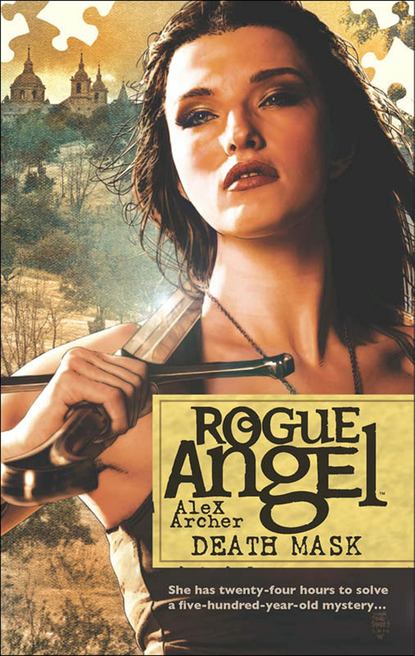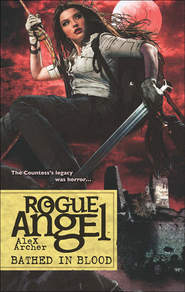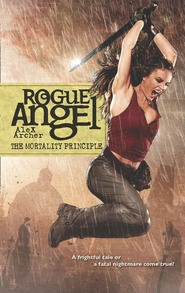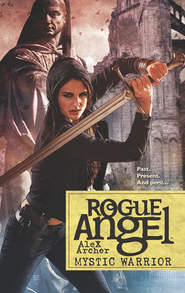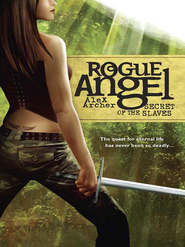По всем вопросам обращайтесь на: info@litportal.ru
(©) 2003-2024.
✖
Death Mask
Автор
Год написания книги
2019
Настройки чтения
Размер шрифта
Высота строк
Поля
This was what he’d been hoping against hope to find. He’d half expected it not to be here. His friend had been obsessed with the Inquisition, and it was no surprise that Tomás de Torquemada figured into this. Still, he hadn’t dared to hope Goya had known anything about a mask because there was no way for him to reach across the years and ask him. Francisco Goya, though, had reached across the years to talk to Roux the only way he knew how—through his art.
“What can you tell me about this?” Roux asked, trying not to make the inquiry sound as urgent as it felt. He wanted to hear it from their lips, but it was hard not to jump to conclusions. It had to be the Mask of Torquemada.
“Ah, this one. Quite...haunting, isn’t it? Certainly one of his darker studies. There is, of course, the possibility this study has nothing to do with his Inquisition sketches,” the curator began, but the woman cut him off.
“There were stories, none of them written down at the time, sadly—at least none that have been recovered—and many of them conflict, but it is believed that the Grand Inquisitor, Torquemada himself, wore a mask when he witnessed interrogations.” The woman pursed her lips, clearly not comfortable bringing anything as sordid as torture into the conversation. The art was all that mattered to her. “There is one school of thought that believes he wore it chiefly to terrify, but there is another that believes it was to hide his own fear.”
“From what I know of the man, that doesn’t seem likely,” Roux said. The many religious zealots he’d encountered in his life had all relished their work. It was the one thing they all had in common.
“As I was saying,” she continued as if he hadn’t spoken. “There is an alternative theory, that the mask was actually a torture device itself.”
“Interesting.”
“Indeed. It may even have been the inspiration for Alexander Dumas’s The Man in the Iron Mask.”
“Or Dumas’s mask might have helped create some of the myth around Torquemada himself,” the curator suggested.
It was possible, of course. And from what Roux remembered about Goya in his final years, it was likely the artist would have made that kind of connection, too. In 1847, Dumas had popularized the story of Eustache Dauger, held in jail in 1669. Roux had never particularly liked the man. Dauger was a poseur, but then, by the time they had rubbed shoulders in the royal court of Versailles, Roux was long past the part of his life where he’d craved any sort of notoriety. He was a creature of shadows by then, moving silently, obsessed with the search for the lost fragments of Joan of Arc’s shattered blade.
“When do you think these were drawn?” he asked.
“Goya started work on The Inquisition Tribunal in 1812, so these sketches must date from earlier than that.”
More than a decade before he’d first met the man. “The mask did not make it into that painting,” Roux noted.
“Which is not particularly unusual for an artist like Goya. He made hundreds of preliminary sketches, working on countless details that didn’t make it into the final works for whatever reason.”
What she said was quite true, but there was something about the drawing that made Roux think the artist had other reasons for not including it in the final painting. Certainly this wasn’t something conjured from his imagination. Goya was quite grounded in his studies of the Inquisition pieces. He wasn’t given to flights of fancy. No, the old man couldn’t shake off the feeling that Goya had drawn this from life, right down to the ribbon that tied the mask in place.
“Is there any way I could have a copy of this?”
“I’m sorry, that’s quite out of the question,” the woman said, but this time it was the curator’s turn to step in, not wanting their unhelpfulness to get back to the board member who’d facilitated Roux’s visit. She was that powerful in this world.
“I’m sure there’s some way we can accommodate you, sir.”
The woman gritted her teeth, determined to put herself in between the man and her treasure. “These cannot just be placed in the photocopier, you know.”
Roux had no idea if that was what the curator had in mind, but he had a simple enough solution and one that would be far more efficient, while leaving the drawings untouched. He fished his phone out of his pocket and held it up like a flag of truce. They both looked at him as if they couldn’t quite comprehend what he was thinking. He spelled it out for them.
“If I could just take a photograph? That would be quite incredible. I would be forever in your debt.”
“Of course,” the curator said, fussing around to make sure that Roux had enough room.
Roux glanced at the woman. While she didn’t seem enamored by his request, she didn’t object.
He captured a single image of the sketch. There was nothing else he was likely to learn here, so he gave his thanks and made his farewells, promising to put in a good word with his friend when he saw her next.
The curator couldn’t hide his pride. “Our pleasure.”
The woman forced a smile. She clutched the portfolio close to her breast. It would be hidden away again, lost to the world until the next exhibition. There was something sad about that, but it was equally wonderful that new generations would discover these treasures and keep on discovering them as long as there was someone like her to cherish them. He smiled his thanks and followed the curator back out through the warren of corridors to the main glass doors.
Stepping outside, Roux had to look up and down the street several times before he spotted the car, and Mateo standing beside it. The driver waved and slid back behind the wheel, driving up to him. As he got in and closed the door, Roux heard the sound of an engine starting up close by.
“Did you find what you were looking for?”
“I think perhaps I did,” Roux said, studying the picture on the phone’s screen.
He forwarded the photograph to Annja, then tried to call her, but it went straight to voice mail again. He hung up without leaving a message. Roux put the phone back into his pocket. He glanced through the rear window, taking one last look at the museum. All this time, it had held a secret without even knowing it. Annja would appreciate that.
Roux was still looking out the rear window as the car took a slow right turn. The driver in the car behind them was staring back at him far too intensely for comfort.
This wasn’t the old man’s first time at the rodeo.
He was being followed.
7 (#u1c5f033e-aa37-5642-bed7-bc2054a075c0)
20:00—Valladolid
Annja had expected bones. Bones or dust. Or fragments of one and a gathering of the other. A few rags, perhaps, untouched for generations.
Deep down, there’d been a tiny part of her that had hoped it’d be easy, that she’d push back the lid and see a silver mask lying on some moldering cushion, just waiting to be found. That would have been all of her lottery-ticket, late-running-for-a-train and traffic-lights-in-her-favor luck for the rest of her life all rolled into one.
But it wasn’t to be.
She wasn’t that lucky.
Which was bad news for Garin.
The flashlight beam played across the only thing the stone casket contained: a key. A small brass key with worn teeth.
Annja reached inside for it.
She assumed the metal would feel rough, pitted with corrosion given its obvious age, but it was surprisingly smooth. There was the obvious coarseness associated with something made so long ago, but it had weathered the passage of time relatively unharmed, no doubt because of the near-vacuum seal the sarcophagus lid provided. It had been hidden for a reason. More than that, it had been hidden here for a reason. Why, though, had it been placed in an empty coffin marked for a Moor and surrounded by tombs of the Inquisition’s most faithful? That only opened a nest of questions, the most immediate being: What did it unlock?
She heard a sound originating from the direction she’d come. The unexpectedness of it caused her heart to skip a beat.
Someone was heading her way.
Had she been followed down here?
She could make herself known, avoiding an unpleasant confrontation—but that would mean having to explain herself, and it wasn’t as though she had a right to be down here. It would eat up valuable time she couldn’t spare. Or, to be blunt, time Garin couldn’t spare.
She turned off the flashlight and did her best to slide the lid of the sarcophagus back into place without making enough noise to wake the rest of the dead down here. Even so, the grating of stone-on-stone echoed through the chamber.
A voice cried out.
She didn’t like the sound of it.





